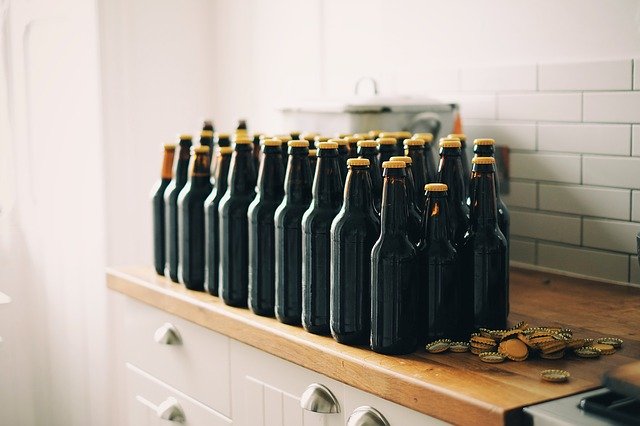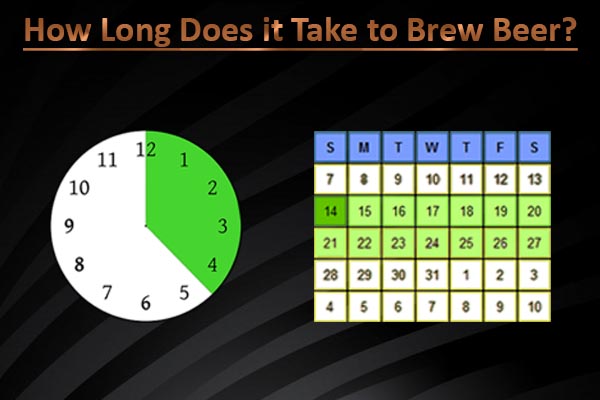How long does it take to brew beer? This might be your first question if you are starting to consider a life of homebrewing. Or you might just be wondering how beer is made and what the process is and how long it takes. It is somewhat of a time consuming process as natural processes such as fermentation need to occur.
Brewing beer is part art, but also a whole lot of science. A lot of natural processes take place during the brew cycle and it doesn’t all happen overnight. So let’s dig in to the specifics so you can find out what you’re in for.
How Long Does it Take to Brew Beer?

- Brew Day: 4 to 4.5 hours
- Primary Fermentation: 1 Week (3-4 Weeks if Skipping Secondary Fermentation)
- Secondary Fermentation: 2 Weeks
- Time in the Bottles: 2 Weeks or More
- TOTAL Time from Brew Day to Drinking: 5 Weeks Minimum
Stage 1 – Brew Day: Time – 4 to 4.5 Hours
To make beer you need four key ingredients – water, hops, malt extract or grain, and yeast. It’s also best to have some nicer pieces of equipment to make your brew better like a good brew kettle and wort chiller. When these four ingredients are combined together they create a sugary liquid known as the wort. The brew day happens in four steps which will take about four to four and a half hours to complete. It can get rather hectic on brew day so make sure you prepare ahead of time to shorten your brew day.
The Mash: Time – 60 minutes
Mashing is the term used for the hot water steeping process. This process hydrates the barley, activates malt enzymes, and converts the grain starches into fermentable sugars. All-grain recipes generally call for a 60 minute single infusion mash, but depending on the beer you’re making and the malts you’re using it may not take that long.
Sparging: Time – 60 to 90 minutes
Also called lautering, sparging is a step at the end of the mashing process when hot water is run through the grain bed to extract a sweet liquid. This when you end up with your wort. Wort is later boiled and fermented to produce beer. Continuously sparging a single mash can take 60 to 90 minutes, and you must maintain the temperature of your sparge water between 75-80 degrees Celsius in order to remove all converted sugars.
The Hop Boil: Time – 60 minutes
At this stage the wort is boiled and the hops are added. Also, at this stage you will see the Hot Break. The hot break is the moment when the wort comes to a boil and the bubbling wort breaks through the layer of foam that has collected on the surface of the liquid. Hops are added in doses at the beginning, middle, and very end of the boil.
Pitching the Yeast: Time – A few minutes
At this stage sanitation is key. Make sure all of your tools are clean and sterile – even the scissors used to open a yeast packet if that is the type of yeast you’re using. Pitch (pour) the yeast into your fermenter and gently stir the yeast in with a sanitized stirrer. When the yeast submerges clamp the lid on tight and fill the air lock with water to indicate the fill line. Push the airlock into the hole in the lid of the bucket. The most labor intensive part of brewing is done. Place your fermenter in a dark and cool place as we move on to the next stage of fermentation.
Stage 2 and 3- Fermentation: One or Two Stage Fermentation?
This is where you need to make a decision. Are you going to go with a single stage fermentation or a two stage fermentation? If you are going with a single stage fermentation than you need to leave the beer where it is for a total of two to three weeks. But if you are going to go with a two stage fermentation than the time needs to be split up between the different stages of fermentation.
Primary Fermentation: 1 Week (3-4 Weeks if Skipping Secondary Fermentation)
As we begin to understand and answer the question “How long does it take to brew beer?” we’ll find that most of the time involves waiting and patience. Although the hardest part of the process is over in making the wort the most difficult part may actually be waiting for the beer to ferment.
Primary fermentation takes about one week, and active fermentation should start within the first 12 hours. At this stage, the yeast eats up all of the sugars and starts producing alcohol. Note that if you decide to skip secondary fermentation than you should have a fermentation time of 3-4 weeks.
Secondary Fermentation: 2 Weeks
There’s debate as to whether secondary fermentation is even necessary. The yeast is still active, but is now working on the more complex sugars and compounds. Solids settle out of the beer and the flavors begin to mellow. If you tasted your beer earlier on in the fermentation process the flavors would seem more harsh and unbalanced than they are now. A sulfur-like flavor is particularly common in “young” beers at this stage. Also, more solids fall out of suspension and collect at the bottom of the jug, leaving your finished beer much more clear.
Stage 4 – Time in Bottle: Time – 2 Weeks or More

Carbonation is a defining texture of any beer style. Carbonation occurs naturally in beer since yeast produce carbon dioxide along with alcohol when they eat sugar. Giving the bottles at least two weeks at room temperature will allow the yeast to process the sugar and produce the carbon dioxide. Depending on the kind of beer you are making the longer you leave the beer in the bottle to carbonate the better the taste will be.
Although you hear about bottle shock mostly in wine, there is a slight bottle shock in beer as oxygen is reintroduced. Beers sometimes go through a bit of bottle shock when they’re first bottled. If you taste the beer early, you might pick up some harsh notes or sulfuric flavors.
Final Thoughts: How Long Does It Take To Brew Beer?
We have now answered the question of “How long does it take to brew beer?” and discussed some of the processes along the way. The brew time is at minimum a five week process. But like wine, in many cases the longer you let natural process evolve the better the beer will taste. The brew day starts out hot and heavy and most of your work is done here. After that, it is mostly just a waiting game until you decide to move to a secondary fermentation process if you choose to do that. If you don’t move to secondary fermentation than you will have a gap from brew day up until the time you decide to bottle.


